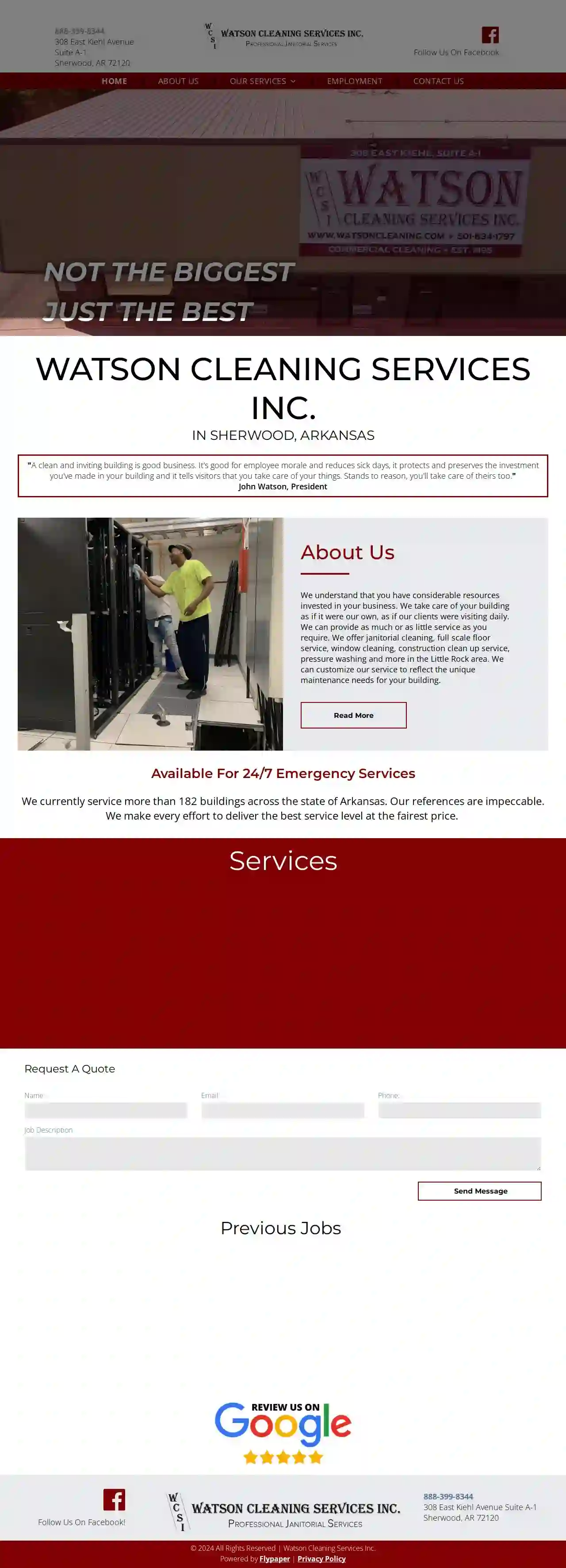Cleaning Services Dumas
Best Local Cleaners in Dumas
Get multiple Cleaning Companies quotes for your project today! Compare profiles, reviews, accreditations, portfolio, etc... and choose the best deal.
Service Needed
City or Town

Razorback Janitorial
4.413 reviewsLittle Rock, US- Services
- Why Us?
Get Quote
Office Pride Commercial Cleaning Services of Hot Springs-Benton AR
3.45 reviewsLittle Rock, US- Services
- Why Us?
Get Quote- Pr
Proactive Cleaning Solutions of Arkansas Inc
4.918 reviewsLittle Rock, US- Services
- Why Us?
Get Quote 
Apex Cleaning Company, LLC
54 reviewsLittle Rock, US- Services
- Why Us?
Get Quote
Watson Cleaning Services Inc
4.512 reviewsLittle Rock, US- Services
- Why Us?
Get Quote
Capital City Professional Cleaning LLC
4.913 reviewsLittle Rock, US- Services
- Why Us?
Get Quote
Spotless Janitorial Services
51 reviewsLittle Rock, US- Services
- Why Us?
Get Quote- Mo
Morgan Supply
4.112 reviewsLittle Rock, US- Services
- Why Us?
Get Quote 
Central One Service LLC
4.7964 reviewsLittle Rock, US- Services
- Why Us?
Get Quote
All-Outcleaning llc.
51 reviewsLittle Rock, US- Services
- Why Us?
Get Quote
Over 60,241+ Janitorial Businesses in our network
Our janitorial services operate in Dumas and surroundings!
CleaningMatch has curated and vetted Top Cleaning Contractors near Dumas. Find a top & reliable contractor today.
Frequently Asked Questions About Cleaning Services
Find answers to common questions about cleaning services and hiring cleaning companies in the USA.
- Communicate clearly: Before the cleaning, communicate your expectations and any specific cleaning requirements. Provide a list of areas you want them to focus on or any tasks you want them to prioritize.
- Provide access: Ensure the cleaners have access to all the areas that need cleaning. Unlock doors, clear clutter, and provide any necessary instructions.
- Walk through after cleaning: Once the cleaning is complete, do a walk-through with the cleaners to inspect their work. Address any concerns or areas that need attention.
- Provide feedback: Give the cleaning service feedback on their performance. Let them know what you were happy with and any areas they can improve.
- Build a relationship: Establish a good relationship with the cleaning service by communicating openly, treating them with respect, and providing clear instructions.
- Prepare the Windows: Remove dust and debris from windows using a brush, vacuum, or damp cloth.
- Cleaning Solution: Use a commercial glass cleaner or a homemade solution of equal parts water and vinegar.
- Spray and Wipe: Spray the cleaning solution onto the window, ensuring even coverage.
- Squeegee Technique: Use a squeegee to wipe the cleaner from top to bottom, overlapping each stroke by about an inch. Wipe the squeegee blade clean after each stroke.
- Dry Edges: Wipe the edges of the window with a clean, dry microfiber cloth to remove any remaining moisture.
- Dishes: Load the dishwasher or wash dishes by hand.
- Sink: Clean the sink with a sponge or cloth and dish soap. Pay attention to the faucet and drain. You can also use a baking soda paste to remove stubborn stains.
- Countertops: Wipe down countertops with a disinfectant cleaner or all-purpose cleaner.
- Stovetop: Clean the stovetop with a degreaser or stovetop cleaner. Remove burner grates and wash them separately if needed.
- Oven: Clean the oven according to the manufacturer's instructions. You can use a self-cleaning function or a commercial oven cleaner.
- Microwave: Clean the microwave interior with a damp cloth or sponge. For stuck-on food, heat a bowl of water with lemon juice in the microwave for a few minutes to loosen debris.
- Refrigerator: Wipe down the refrigerator shelves and drawers with a damp cloth or sponge. Remove any expired food and clean spills promptly.
- Floors: Sweep or vacuum the floor, then mop with a floor cleaner suitable for your kitchen floor type.
- Trash: Empty the trash can and recycling bin.
- Floors: Use floor cleaners designed for your specific floor type, such as hardwood, tile, or laminate. Avoid using harsh cleaners that can strip finishes or cause discoloration.
- Countertops: Clean granite, marble, or quartz countertops with pH-neutral cleaners to prevent etching or damage. Use disinfecting wipes or sprays for other countertops.
- Bathrooms: Use bathroom cleaners designed to remove soap scum, mildew, and hard water stains. Avoid using abrasive cleaners on fixtures or tiles.
- Glass and Mirrors: Clean windows and mirrors with glass cleaners that leave a streak-free finish. Avoid using paper towels, which can leave lint behind.
- Appliances: Clean stainless steel appliances with specialized cleaners that prevent streaks and fingerprints. Use degreasers for ovens and stovetops.
How can I make sure my cleaning service does a good job?
To ensure a satisfactory cleaning service, follow these tips:
Clear communication, a thorough inspection, and constructive feedback are key to getting the best results from your cleaning service.
Clear communication, a thorough inspection, and constructive feedback are key to getting the best results from your cleaning service.
What is the best way to clean windows without streaks?
Achieving streak-free windows requires the right technique and cleaning solutions. Follow these steps:
For best results, clean windows on a cloudy day or in the shade to prevent the cleaning solution from drying too quickly and leaving streaks.
For best results, clean windows on a cloudy day or in the shade to prevent the cleaning solution from drying too quickly and leaving streaks.
What is the most efficient way to clean a kitchen?
A clean kitchen is essential for food safety and a pleasant cooking experience. Here's an efficient kitchen cleaning process:
Regularly cleaning your kitchen helps maintain a hygienic and organized space for cooking and dining.
Regularly cleaning your kitchen helps maintain a hygienic and organized space for cooking and dining.
How do I choose the right cleaning products for different surfaces?
Different surfaces require specific cleaning products to avoid damage and achieve optimal results. Here's a guide:
If you're unsure about the right cleaning product for a surface, consult the manufacturer's instructions or seek advice from a cleaning professional.
If you're unsure about the right cleaning product for a surface, consult the manufacturer's instructions or seek advice from a cleaning professional.
How can I make sure my cleaning service does a good job?
To ensure a satisfactory cleaning service, follow these tips:
Clear communication, a thorough inspection, and constructive feedback are key to getting the best results from your cleaning service.
- Communicate clearly: Before the cleaning, communicate your expectations and any specific cleaning requirements. Provide a list of areas you want them to focus on or any tasks you want them to prioritize.
- Provide access: Ensure the cleaners have access to all the areas that need cleaning. Unlock doors, clear clutter, and provide any necessary instructions.
- Walk through after cleaning: Once the cleaning is complete, do a walk-through with the cleaners to inspect their work. Address any concerns or areas that need attention.
- Provide feedback: Give the cleaning service feedback on their performance. Let them know what you were happy with and any areas they can improve.
- Build a relationship: Establish a good relationship with the cleaning service by communicating openly, treating them with respect, and providing clear instructions.
Clear communication, a thorough inspection, and constructive feedback are key to getting the best results from your cleaning service.
What is the best way to clean windows without streaks?
Achieving streak-free windows requires the right technique and cleaning solutions. Follow these steps:
For best results, clean windows on a cloudy day or in the shade to prevent the cleaning solution from drying too quickly and leaving streaks.
- Prepare the Windows: Remove dust and debris from windows using a brush, vacuum, or damp cloth.
- Cleaning Solution: Use a commercial glass cleaner or a homemade solution of equal parts water and vinegar.
- Spray and Wipe: Spray the cleaning solution onto the window, ensuring even coverage.
- Squeegee Technique: Use a squeegee to wipe the cleaner from top to bottom, overlapping each stroke by about an inch. Wipe the squeegee blade clean after each stroke.
- Dry Edges: Wipe the edges of the window with a clean, dry microfiber cloth to remove any remaining moisture.
For best results, clean windows on a cloudy day or in the shade to prevent the cleaning solution from drying too quickly and leaving streaks.
What is the most efficient way to clean a kitchen?
A clean kitchen is essential for food safety and a pleasant cooking experience. Here's an efficient kitchen cleaning process:
Regularly cleaning your kitchen helps maintain a hygienic and organized space for cooking and dining.
- Dishes: Load the dishwasher or wash dishes by hand.
- Sink: Clean the sink with a sponge or cloth and dish soap. Pay attention to the faucet and drain. You can also use a baking soda paste to remove stubborn stains.
- Countertops: Wipe down countertops with a disinfectant cleaner or all-purpose cleaner.
- Stovetop: Clean the stovetop with a degreaser or stovetop cleaner. Remove burner grates and wash them separately if needed.
- Oven: Clean the oven according to the manufacturer's instructions. You can use a self-cleaning function or a commercial oven cleaner.
- Microwave: Clean the microwave interior with a damp cloth or sponge. For stuck-on food, heat a bowl of water with lemon juice in the microwave for a few minutes to loosen debris.
- Refrigerator: Wipe down the refrigerator shelves and drawers with a damp cloth or sponge. Remove any expired food and clean spills promptly.
- Floors: Sweep or vacuum the floor, then mop with a floor cleaner suitable for your kitchen floor type.
- Trash: Empty the trash can and recycling bin.
Regularly cleaning your kitchen helps maintain a hygienic and organized space for cooking and dining.
How do I choose the right cleaning products for different surfaces?
Different surfaces require specific cleaning products to avoid damage and achieve optimal results. Here's a guide:
If you're unsure about the right cleaning product for a surface, consult the manufacturer's instructions or seek advice from a cleaning professional.
- Floors: Use floor cleaners designed for your specific floor type, such as hardwood, tile, or laminate. Avoid using harsh cleaners that can strip finishes or cause discoloration.
- Countertops: Clean granite, marble, or quartz countertops with pH-neutral cleaners to prevent etching or damage. Use disinfecting wipes or sprays for other countertops.
- Bathrooms: Use bathroom cleaners designed to remove soap scum, mildew, and hard water stains. Avoid using abrasive cleaners on fixtures or tiles.
- Glass and Mirrors: Clean windows and mirrors with glass cleaners that leave a streak-free finish. Avoid using paper towels, which can leave lint behind.
- Appliances: Clean stainless steel appliances with specialized cleaners that prevent streaks and fingerprints. Use degreasers for ovens and stovetops.
If you're unsure about the right cleaning product for a surface, consult the manufacturer's instructions or seek advice from a cleaning professional.